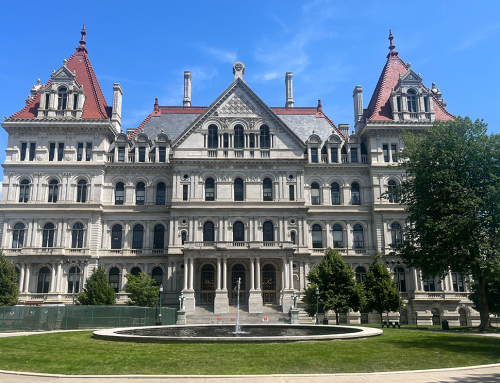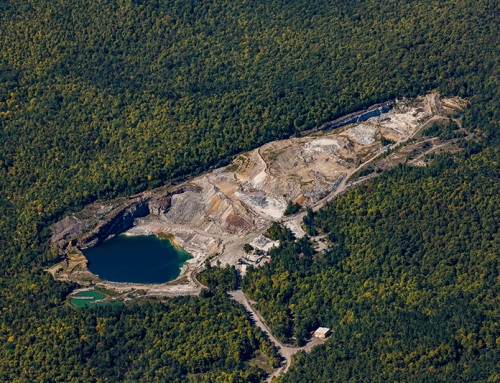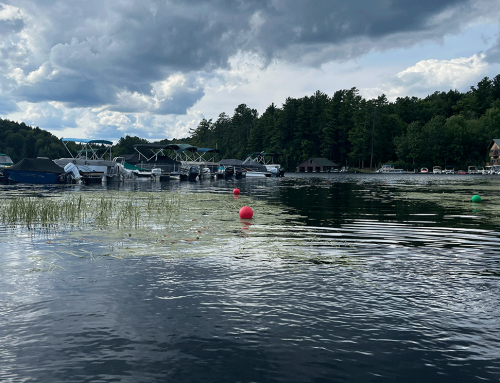On March 8, 2024, Protect the Adirondacks called upon the Adirondack Park Agency (APA) and Department of Environmental Conservation (DEC) to launch an enforcement investigation into an invasive “whiskey fungus” in the Mineville area in the Town of Moriah, Essex County. PROTECT urged the APA and DEC to take enforcement action against WhistlePig Whiskey, which owns and operates the apparent sources of vapors that create the whiskey fungus, which has coated homes in the Mineville area with a black mold-like fungus.
The problem appears to stem from the operations of a whiskey storage warehouse and bottling facility in Mineville. In 2016, WhistlePig Whiskey, a Vermont company, set up shop on land it purchased from the Essex County Industrial Development Agency. The company distills its whiskey in Shoreham, Vermont, and has upscale “tasting rooms” in Stowe and Quechee. WhistlePig built, and now operates, seven 14,000-square-foot warehouses and one 14,000-square-foot bottling plant. WhistlePig apparently has stated it could not find affordable land in Vermont for its warehouses, so it came to Moriah. According to local residents, WhistlePig has been unresponsive to their concerns about its offsite pollution.
The warehouses are used to store and age the company’s whiskey products, which emit vapors containing a fungus commonly referred to as “whiskey fungus,” “warehouse staining fungus,” and “distillery fungus.” Its scientific name is Baudonia compniacensis. The vapors form as the whiskey ages. When the vapor escapes to the outdoors, it coats surfaces it contacts with a black mold, which is currently negatively affecting homes in Mineville. WhistlePig’s warehouses are coated with the fungus and houses in the area are turned gray as siding, roofs, gutters, shingles, and shutters are contaminated and covered with a black mold-like fungus. Stop signs in the area show the fungus and property owners up to a mile away from the warehouses report being infested with the fungus. The local Hudson Headwaters Health Clinic has the fungus on its facility.
On March 21st, the DEC took action and sent WhistlePig a letter ordering them to fix the problem. The DEC letter stated:
The spread of this fungus has led to an increasing number of public complaints to DEC, including five in the last 12 months. In addition, DEC anticipates that WhistlePig’s planned expansion of this facility is likely to cause additional fungus growth and lead to more complaints from community residents unless WhistlePig takes appropriate actions to mitigate the effects of its emissions.
DEC is well within its authority to clamp down on WhistlePig. The DEC air regulations, as recounted in PROTECT’s letter to the agency, state:
No person shall cause or allow emissions of air contaminants to the outdoor atmosphere of such quantity, characteristic or duration which are injurious to human, plant or animal life or to property, or which unreasonably interfere with the comfortable enjoyment of life or property. Notwithstanding the existence of specific air quality standards or emission limits, this prohibition applies, but is not limited to, any particulate, fume, gas, mist, odor, smoke, vapor, pollen, toxic or deleterious emission, either alone or in combination with others. (6 NYCRR § 211.1)
WhistlePig appears to be in violation of this DEC air regulation. A home covered with this fungus is clearly an unreasonable interference with the enjoyment of one’s property. DEC has reportedly taken samples of the mold on contaminated residences and confirmed the presence of whiskey fungus. We applaud DEC for taking action to address the emissions from the WhistlePig facility:
DEC is requiring WhistlePig Whiskey Company to submit, within 30 days, a written corrective action plan for DEC’s review and approval to address the effects of the WhistlePig facility’s emissions. The plan should include specific measures and a schedule for implementation to either neutralize ethanol emissions or to mitigate the effects of whiskey fungus in the facility’s environs.
For its part, APA is apparently investigating but has been slow to take enforcement action, despite a requirement in the permit that APA issued to WhistlePig that there would be no offsite emissions from the operations. Under the “Project Impacts” part of this permit, it states:
The commercial use authorized herein will primarily involve storage. Approximately one delivery per day will occur between normal daytime business hours. Whiskey will be delivered by tanker truck to Warehouse 1, and barrels will be filled there and then transported by forklifts to the other storage warehouses. As described by the permittee, the proposed operations, including future Phase 3 and 4 activities (Bottling and Distillation), will create no off-site noise, fumes, smoke, or emissions. (APA Permit P2016-226)
The fungus covering nearby residences is clearly an “offsite … emission” that the permit states as a condition is not allowed. WhistlePig’s ongoing release of whiskey fungus vapors from its storehouses and the resulting presence of whiskey fungus on nearby homes appears to constitute “off-site . . . fumes . . . or emissions” in violation of its APA permit. APA needs to act to bring this facility into compliance with its permit.
The timing for DEC action was good, but it is particularly important that the APA acts promptly, because WhistlePig’s emissions are likely to increase as a result of the company’s plan to significantly expand its operations by constructing additional warehouses to store and age its product. While it’s a good sign that DEC has asserted its authority and is working to bring this facility into compliance, it is high time for the APA to do the same.









